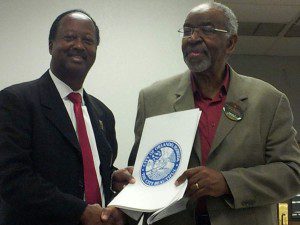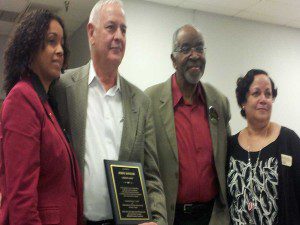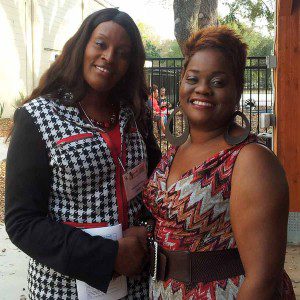
The Multi-Cultural Addictions Network and the Orange County Health Department, in conjunction with 14 other community programs, teamed up Thursday, to mark National Black HIV/AIDS Awareness Day.
Under the theme “Getting to Zero,” a community forum and an awards ceremony to honor “Unsung Heroes” in the fight against HIV/AIDS and substance abuse, drew scores of residents from many of Orlando’s urban communities.
Dr. John Robertson, Executive Director, Multi-Cultural Addictions Network explained that, while HIV/AIDS strikes all races, National Black HIV/AIDS Awareness Day is meant to raise awareness about the continuing devastation of the epidemic, particularly in the Black community.
“Many individuals may not realize that the rate of HIV/AIDS among Black men is six times the rate of white men and among Black women it approaches twenty times the rate of white women,” said Robertson. “But it is 100 percent preventable and everyone needs to know they can protect themselves.”
He adds that, education – how the virus is transmitted and how it is not – is one of the keys to preventing its spread and encourages everyone to get tested. “If you know your status you can make a decision as to whether you want to engage in that particular relationship or not.”

Notwithstanding the current statistics, Robertson noted that progress is being made, as the rate of new infections continues to decline.
HIV testing and health screenings were available, in confidential mobile vans, at Frontline Outreach Center, 3000 C.R. Smith Street, in Orlando, the site of the commemoration of National Black HIB/AIDS Awareness Day.
Today’s event also entailed the reading of a mayoral proclamation by Commissioner Sam Ings, that proclaimed February 7, 2013, as National Black HIV/AIDS Awareness Day in the city of Orlando.
Aleathea Morrison, a native of Jacksonville and keynote speaker, shared her personal story of how she overcame a life of molestation, rape, drug addiction, prostitution, imprisonment and gang involvement and 28 years being diagnosed with the AIDS virus. Like Robertson, she believes progress is being made in fighting the epidemic, but says, the goal of “Getting to Zero” is an awesome vision and one that will require a lot more work.

“Access to medications and care for those who fall out of care remains one of the obstacles,” said Morrison, who serves as the Housing Manager and Counselor at the Sulzbaher Center for the Homeless. “More attention needs to be paid especially to the homeless with HIV/AIDS, women and children and the MSM population.”
Morrison, who spends a major portion of her day educating and counseling those in need said, she is motivated by her desire to live and to make a difference people’s lives.
“Of course my major motivation comes from my God and my desire to live and be effective,” she said. “I want to leave a legacy and not be remembered by any diagnosis, but because of who I am within.”
National Black HIV/AIDS Awareness Day was established in 1999 by five national organizations supported by the Centers for Disease Control and Prevention, and encourages people to “Get Educated! Get Tested! Get Involved! Get Treated!”


